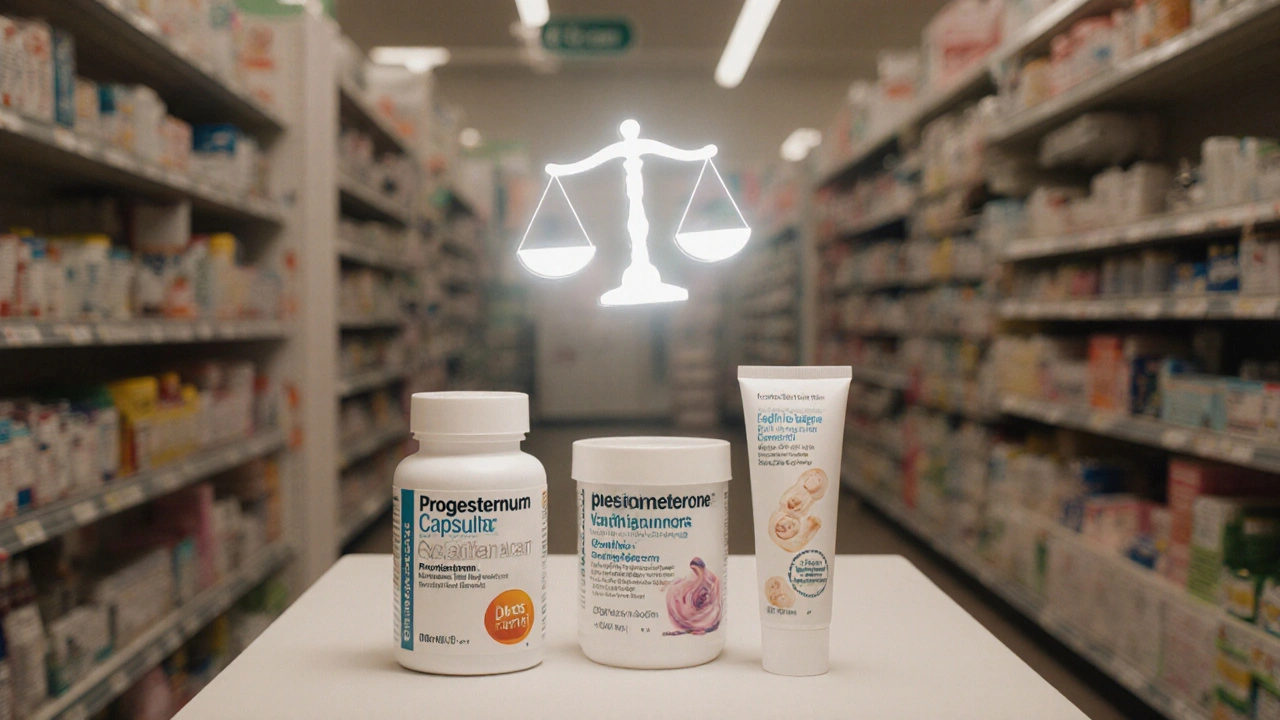Prometrium (Progesterone) vs Alternatives: Benefits, Risks, and How to Choose
 Sep, 26 2025
Sep, 26 2025
Progesterone Therapy Selector
Select your preferences to find the best progesterone option for you.
Choose Your Clinical Indication
Preferred Route of Administration
Side Effect Concerns
Prometrium is a micronized, bioidentical progesterone capsule approved by the FDA for luteal‑phase support, infertility treatment, and hormone‑replacement therapy (HRT). It delivers progesterone orally, mimicking the body’s natural hormone profile.
What is Prometrium?
Prometrium contains micronized progesterone, a powder that’s ground into tiny particles to improve absorption in the gut. The standard strength is 100mg per capsule, but doses can range from 25mg up to 400mg depending on the indication. Because it’s chemically identical to the progesterone your ovaries produce, it’s often called a “bioidentical” hormone.
Key attributes of Prometrium:
- Oral administration - easy to take with water.
- Peak serum levels appear within 2hours, supporting the luteal phase after ovulation.
- FDA‑approved for use in assisted reproductive technologies (ART) and for menopausal women who need progesterone to counterbalance estrogen.
Key Differences Between Prometrium and Other Progesterone Options
Progesterone therapy comes in several forms, each with its own pharmacokinetics and clinical niche. Below are the most common alternatives and how they stack up against Prometrium.
Medroxyprogesterone acetate (often marketed as Depo‑Provera) is a synthetic progestin delivered via intramuscular injection. Unlike oral micronized progesterone, it has a long half‑life (about 30days) and provides steady serum levels, making it popular for contraception and endometrial protection.
Norethisterone is another synthetic progestin, typically taken as a tablet. It’s more potent than natural progesterone and is used for menstrual disorders and hormone‑replacement regimens where a stronger effect is desired.
Dydrogesterone is a retro‑steroid with a profile closer to natural progesterone than many other progestins, often prescribed in Europe for recurrent miscarriage.
Vaginal options such as Crinone (progesterone gel) bypass the liver, delivering higher local concentrations to the uterus-a benefit for IVF cycles. Depo‑Provera (intramuscular) offers a “once‑a‑month” convenience but carries a higher risk of bone‑density loss with prolonged use.
For those avoiding pharmaceuticals, Chasteberry (Vitex agnus‑castus) is a herbal supplement thought to modulate the pituitary‑ovarian axis, though clinical evidence remains limited.
When to Choose Prometrium
Consider Prometrium if you need:
- Short‑term luteal‑phase support during IVF or IUI cycles.
- A hormone‑replacement option that is chemically identical to native progesterone, reducing the risk of progestin‑related side effects such as mood swings or lipid changes.
- An oral formulation that fits into a daily routine without injections or gels.
Patients with a history of thromboembolic disease often prefer bioidentical progesterone because it has a lower impact on clotting factors compared with synthetic progestins.

Top Alternatives Compared
| Entity | Form | Typical Dose Range | Bioavailability | FDA Status | Primary Use |
|---|---|---|---|---|---|
| Prometrium | Oral capsule | 25‑400mg daily | ≈10‑15% (first‑pass metabolism) | Approved | Luteal‑phase support, menopausal HRT |
| Medroxyprogesterone acetate | IM injection | 150mg every 12weeks | ≈100% (bypass gut) | Approved | Contraception, endometrial protection |
| Norethisterone | Oral tablet | 5‑10mg daily | ≈50% (partial first‑pass) | Approved | Menstrual disorders, HRT adjunct |
| Dydrogesterone | Oral tablet | 10‑30mg daily | ≈30‑40% | Approved (EU, some regions) | Recurrent miscarriage, HRT |
| Crinone (progesterone gel) | Vaginal gel | 90‑120mg daily (applied) | ≈80% (local absorption) | Approved | IVF luteal support |
| Chasteberry (Vitex) | Herbal supplement | 400‑800mg daily (extract) | Not quantified (herbal) | Dietary supplement | Menstrual regulation, mild PMS |
Reading the table helps you spot which form aligns with your lifestyle and clinical goal. Oral capsules (Prometrium) win on convenience, but they suffer from lower bioavailability. Vaginal gels deliver more progesterone to the uterus, which can be critical for IVF outcomes.
How to Decide - A Practical Checklist
Use this quick checklist during your next doctor visit:
- Indication: Are you treating infertility, menopausal symptoms, or preventing endometrial hyperplasia?
- Route preference: Do you mind daily pills, or would you rather a monthly injection?
- Side‑effect profile: Do you have a history of mood disorders, weight gain, or bone density concerns?
- Cost & insurance: Check whether your plan covers the brand‑name oral capsule or prefers a generic progestin.
- Clinical guidelines: Follow the Endocrine Society’s recommendation to match progesterone type with estrogen dose in HRT.
If you tick “oral convenience” and “bioidentical preference,” Prometrium is a strong candidate. If you need sustained levels without daily dosing, Medroxyprogesterone acetate may be better.
Related Concepts and How They Interact
Progesterone never works in isolation. Here are three closely linked ideas you’ll encounter when researching hormone therapy:
- Bioidentical hormone replacement therapy (BHRT) - a broader category that includes both progesterone and estrogen compounds that are structurally identical to those the body makes.
- Estrogen therapy - usually paired with progesterone in women with a uterus to prevent endometrial overgrowth.
- Assisted reproductive technology (ART) - IVF, IUI, and related procedures where luteal‑phase support is a standard protocol.
Understanding these connections clarifies why a clinician might swap an oral progestin for a vaginal gel in an IVF cycle, or why a BHRT clinic may favor micronized progesterone over synthetic options.
Next Steps for Patients and Providers
1. Schedule a medication review with your endocrinologist or fertility specialist.
2. Bring a list of current supplements (including herbal items like chasteberry) to flag possible interactions.
3. Request a copy of the latest HRT guideline (Endocrine Society, 2024) to see where each progesterone form fits.
4. If cost is a barrier, ask about compounding pharmacies that can create a bioidentical progesterone capsule at a lower price - but verify they follow Good Manufacturing Practice (GMP).
By following these steps you’ll ensure the progesterone choice aligns with your health goals, budget, and lifestyle.

Frequently Asked Questions
Is Prometrium safer than synthetic progestins?
Safety depends on the individual. Because Prometrium is bioidentical, it tends to have a lower impact on lipid profiles and mood compared with synthetic progestins like medroxyprogesterone acetate. However, all hormones carry risks such as blood clotting, so clinicians weigh personal history before prescribing.
Can I switch from oral progesterone to a vaginal gel?
Yes, many fertility specialists switch patients to vaginal gel (e.g., Crinone) when they need higher uterine concentrations. The change usually requires a brief overlap period and a dose adjustment, so always do it under medical supervision.
What are the main side effects of Prometrium?
Common side effects include mild drowsiness, breast tenderness, and occasional nausea. Rarely, users report mood swings or headaches. Because it’s taken orally, a small portion is metabolized in the liver, which can cause a temporary increase in liver enzymes in sensitive individuals.
How does the cost of Prometrium compare to generic progestins?
Prometrium is typically more expensive than generic synthetic progestins because it’s a branded, micronized product. Prices range from $30 to $50 for a 30‑day supply, whereas medroxyprogesterone acetate tablets may cost under $15 for a comparable period. Insurance coverage varies widely, so check your plan.
Is chasteberry an effective alternative to prescription progesterone?
Chasteberry may help with mild PMS by modulating prolactin and luteinizing hormone, but it does not provide the progesterone levels needed for luteal‑phase support during IVF or for protecting the endometrium in HRT. Its evidence base is limited, so it’s best used as a complementary supplement rather than a full replacement.

Abhishek A Mishra
September 26, 2025 AT 16:12I find the oral capsules of Prometrium super convenient for daily routine, especially when you dont want to deal with gels or shots. The bioidentical claim means it mimics our natural progesterone, which can reduce mood swings for many. Just watch the timing of the dose around ovulation for optimal luteal support.
Jaylynn Bachant
September 27, 2025 AT 06:06When we contemplate the essence of a hormone, we are really gazing into the mirror of our own biology. The notion of "bioidentical" is more than a marketing tag; it is a philosophical alignment with nature's own script. Yet, one must also consider the societal narrative that pushes pills over plant extracts. Both pathways have merit, and the choice reflects personal values as much as clinical data.
Srinivasa Kadiyala
September 27, 2025 AT 19:59Everyone seems to glorify Prometrium as the holy grail of progesterone therapy, but consider the pharmacokinetic reality; oral micronized progesterone suffers from first‑pass metabolism, offering only about 10‑15% bioavailability!!! Synthetic progestins like Medroxyprogesterone provide near‑100% systemic exposure, making them arguably more efficient for certain indications!!! Moreover, the supposed "natural" label can be a smokescreen for inconsistent dosing.
Alex LaMere
September 28, 2025 AT 09:52Actually, the first‑pass effect is a well‑known limitation, but clinicians balance it with higher oral doses; the claim of inefficiency is overstated.
Dominic Ferraro
September 28, 2025 AT 23:46If you prioritize convenience and a steroid that looks identical to what your body makes, Prometrium is a solid pick for short‑term luteal support. For patients worried about mood swings, the bioidentical profile often translates to fewer reported affective changes. Conversely, if you need a long‑acting solution without daily pills, injectable options like Depo‑Provera shine. The key is matching the route to your lifestyle and the specific therapeutic goal. Always run the cost‑benefit analysis with your pharmacist.
Jessica Homet
September 29, 2025 AT 13:39Honestly, the hype around "bioidentical" feels like a marketing ploy. I've seen patients switch back and forth, only to end up more confused. Stick to what your doctor prescribes and monitor side effects, not the buzzwords.
mitch giezeman
September 30, 2025 AT 03:32Here’s a quick plan: first, list your primary indication-infertility, menopause, or endometrial protection. Second, decide if a daily pill fits your schedule or you’d rather avoid daily dosing. Third, check for any history of mood issues or weight concerns, as that can steer you toward bioidentical options. Fourth, verify insurance coverage; sometimes the generic progestins are cheaper. Finally, have a follow‑up appointment to tweak the dose based on how you feel.
Kelly Gibbs
September 30, 2025 AT 17:26Sounds like a solid checklist.
KayLee Voir
October 1, 2025 AT 07:19Choosing a progesterone isn’t just about pills; it’s about how the hormone fits into your whole health story. Oral options are great for those who dislike invasive routes, but the local uterine concentration matters in IVF. Balancing convenience with efficacy is the sweet spot for many patients.
Bailey Granstrom
October 1, 2025 AT 21:12The drama around oral versus vaginal delivery often overlooks the fact that vaginal gels provide up to 80% local absorption, which can be a game‑changer for luteal support. However, the convenience factor cannot be dismissed-most patients prefer a pill over a nightly gel application.
Melissa Corley
October 2, 2025 AT 11:06Everyone loves to sing praises for "bioidentical"-but let’s be real, it’s just another buzzword that hides cost and availability issues. If you’re in the US, you’ll pay double for a brand name capsule that does the same thing as a cheap generic progestin. 😒
Kayla Rayburn
October 3, 2025 AT 00:59Cost is definitely a factor, but the clinical outcomes shouldn’t be sacrificed for price alone. Many providers find the bioidentical route worthwhile for specific patients.
Dina Mohamed
October 3, 2025 AT 14:52When you sit down with your doctor, start with a clear roadmap: first, pinpoint the exact clinical goal-whether it’s supporting the luteal phase in an IVF cycle, balancing estrogen in menopause, or protecting the endometrium. Second, map out your daily routine; if you’re a busy professional, a once‑daily oral capsule might be less disruptive than a nightly vaginal gel. Third, weigh side‑effect profiles: synthetic progestins have a higher incidence of weight gain and mood alterations, whereas micronized progesterone tends to be gentler on mood but may cause occasional drowsiness. Fourth, scrutinize the pharmacokinetics-oral micronized progesterone peaks within two hours, delivering about 10‑15% bioavailability, while vaginal formulations bypass first‑pass metabolism and achieve up to 80% local absorption, which can be crucial for uterine priming. Fifth, evaluate insurance coverage; in many plans, generic synthetic progestins are favored, but some specialty pharmacy networks do cover bioidentical options if prescribed for specific indications. Sixth, don’t forget to discuss long‑term bone health-injectable progestins like Depo‑Provera have been linked to bone density loss with prolonged use, so they may be less suitable for younger patients. Seventh, ask about compounding pharmacies; they can sometimes produce lower‑cost micronized progesterone capsules that meet GMP standards, offering a middle ground between brand and generic. Eighth, consider any concurrent supplements-herbal agents like chasteberry can modulate prolactin and may complement progesterone therapy but should not replace prescribed luteal support. Ninth, set measurable milestones: schedule follow‑up labs to monitor hormone levels, lipid panels, and liver enzymes, especially if you have a history of metabolic concerns. Tenth, keep a symptom diary; tracking mood, sleep, and any weight changes will provide valuable feedback for dose adjustments. Finally, maintain open communication with your care team-therapy is iterative, and fine‑tuning the regimen is key to achieving hormonal harmony.
Kitty Lorentz
October 4, 2025 AT 04:46Great checklist, hope it helps everyone.
inas raman
October 4, 2025 AT 18:39Hey folks, just wanted to say that no matter which route you pick, the most important thing is consistency. Stick to the schedule and keep your doctor in the loop. You’ve got this!
Jenny Newell
October 5, 2025 AT 08:32Honestly, the whole "bioidentical vs synthetic" debate feels like jargon‑filled marketing fluff. Most patients care about efficacy and cost, not the label.
Kevin Zac
October 5, 2025 AT 22:26To summarise, the decision matrix includes indication, route preference, side‑effect profile, cost, and guideline alignment. Oral micronized progesterone offers convenience but limited bioavailability. Vaginal gels provide higher uterine concentrations, ideal for IVF support. Injectable progestins give sustained levels with monthly dosing, but watch bone health. Align these factors with patient values for optimal outcomes.
Stephanie Pineda
October 6, 2025 AT 12:19I love how this breaks down the options-so clear! The vibe feels supportive, and the practical tips really empower patients to make informed choices. Keep the positive energy flowing.
Anne Snyder
October 7, 2025 AT 02:12The emphasis on personalized care really resonates. Tailoring the hormonal regimen to lifestyle and clinical needs is the cornerstone of effective therapy.
Rebecca M
October 7, 2025 AT 16:06Indeed, personalization is essential; however, one must also consider evidence‑based guidelines, insurance formularies, and pharmacodynamic properties, ensuring that the chosen regimen aligns with both patient preference and clinical efficacy.